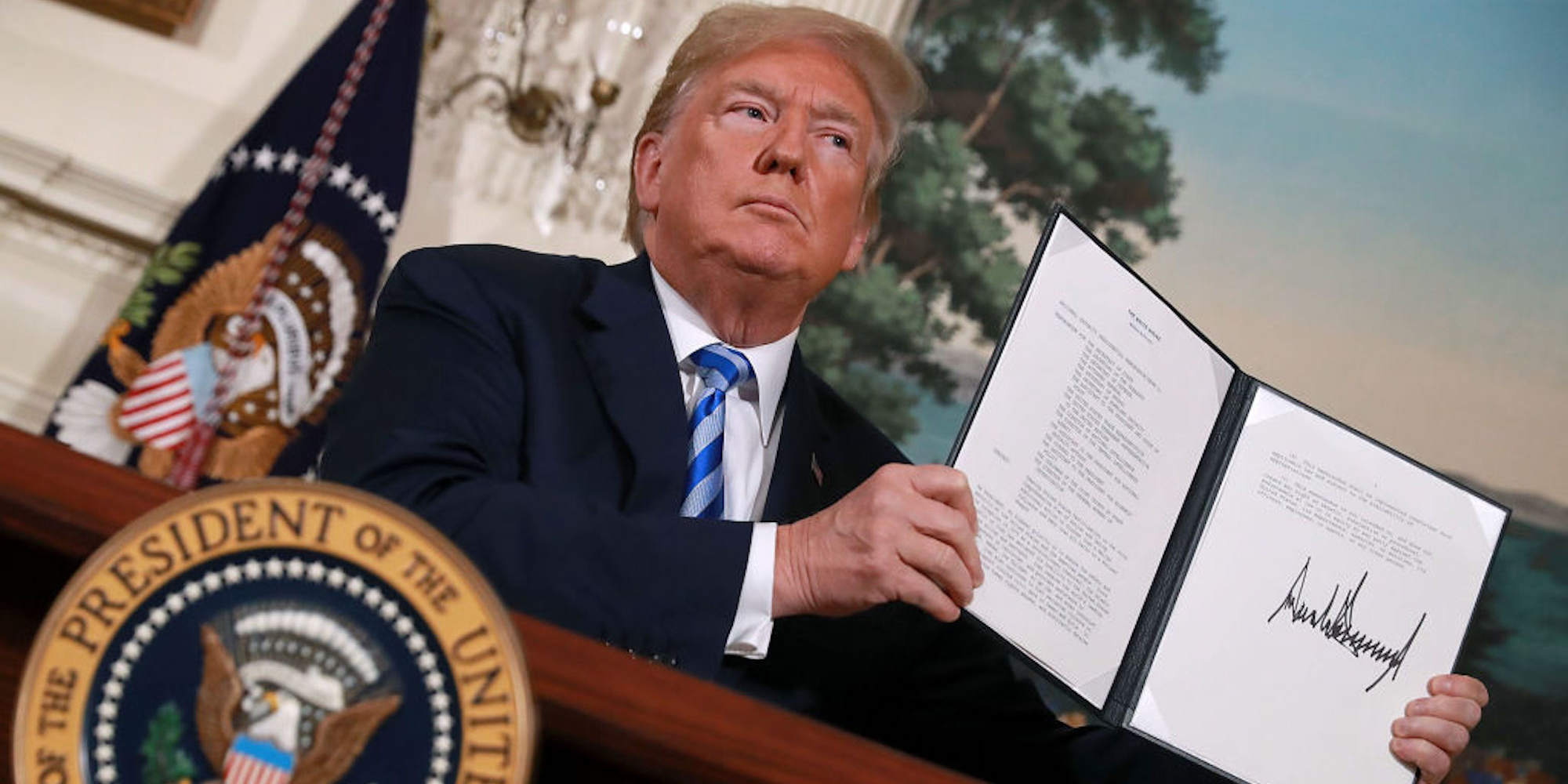- President Donald Trump once claimed his deal-making prowess and toughness would enable him to face down and reduce the threat from America’s adversaries.
- So far, Trump’s “maximum pressure” strategies in Iran and North Korea have achieved little, and in the case of Iran they seem to have spurred increased aggression.
- On Tuesday, Iraqi protesters and members of pro-Iranian militias attacked the US Embassy in Baghdad, torching a reception area, in an incident with echoes of the 1979 Iranian embassy siege.
- North Korean leader Kim Jong Un has frozen weapons tests but is forging ahead with developing new nuclear weapons and long-range missiles that could target the US.
- Visit Business Insider’s homepage for more stories.
President Donald Trump took office claiming that two aspects of his experience uniquely suited him to deal with America’s adversaries: his toughness and his skill at brokering deals, each developed through years in the cutthroat world of New York real estate.
These qualities, he has said, would allow him to face down two of America’s most determined foreign adversaries – Iran and North Korea – that have exasperated US presidents for decades.
His strategy follows a pattern that has been dubbed “maximum pressure”: Ramp up economic sanctions against the governments; threaten, bully, and mock their leaders; and then offer to negotiate, and in negotiations offer economic relief in exchange for new limits of their nuclear abilities.
But so far the strategy has had, at best, limited success. In the case of Iran it could spectacularly backfire just as Trump gears up his case for reelection in November.
Iran targets oil supplies and high-profile US targets
Back in 2016 when he was campaigning for the presidency, Trump pledged to scrap the Iran nuclear deal brokered by President Barack Obama. In 2018, he made good on the promise - arguing that the deal's narrow focus had failed to curtail broader Iranian aggression. He promised to negotiate a new deal.
To do that, he imposed a series of punishing sanctions on the Iranian government that helped send the country's economy into free fall. He offered to talk to Iran's leaders, holding out the promise of an end to the economic pain.

But Iran has refused to respond to Trump's overtures and has instead grown more aggressive in its rhetoric while restarting work at nuclear sites that had been abandoned under the Obama nuclear deal.
Iran and its proxies have launched a series of audacious attacks against US allies in the region and even the US itself.
In June, Iran shot down an advanced US surveillance drone. Trump considered a massive retaliation but decided against it, arguing that no American lives had been lost.
In September, an Iran-linked attack on oil refineries in Saudi Arabia cut off 5% of the world's oil supply and sent markets into chaos. Iran has also been accused of attacking tankers in the Persian Gulf.
And in an incident with clear echoes of the Iranian hostage crisis of 1979 that helped end Jimmy Carter's presidency, on Tuesday protesters and members of Iran-backed militias swarmed the US Embassy in Baghdad, breaching a perimeter wall and torching a reception area.
The attack was a response to US strikes on the Kat'aib Hezbollah militia thought to have killed 25.
The incidents highlight how exposed US forces in the region are to potentially humiliating attacks.
Trump has threatened military action against Iran in response to its aggression.
"Iran will be held fully responsible for lives lost, or damage incurred, at any of our facilities," he wrote in a tweet Tuesday. "They will pay a very BIG PRICE! This is not a Warning, it is a Threat. Happy New Year!"
But, having been elected on a pledge to end US military entanglements abroad, it's a message that could live to haunt him. Back in June, he showed his reluctance to committing to military action against Iran, pulling out of planned airstrikes at the last minute after Iran shot down the US drone.
With Trump's reelection far from secure, it seems unlikely the leadership in Tehran would enter negotiations while the prospect of Trump being replaced by a Democratic politician continues to exist. In the meantime, it can highlight its capacity to inflict further reversals on the US.
North Korea's nuclear program continues
Trump's belligerence toward North Korea in the first year of his presidency had some observers fearing that the US could be on the brink of war. The president threatened to rain "fire and fury" on the reclusive state in the wake of a series of provocative weapons tests, and he ridiculed its leader, Kim Jong Un, as "rocket man."
He squeezed the state with ever-more-punishing economic sanctions.
Initially the strategy seemed to have provided the potential for an astonishing breakthrough.

Kim agreed to meet with Trump and, after a series of high-profile summits, Trump showered praise on the leader of the brutally repressive state, claiming they had fallen "in love."
But these negotiations achieved very little.
Kim froze the new weapons tests that provoked Trump's ire - but US intelligence agencies say the state has continued to quietly develop new nuclear weapons.
Recent satellite images show activity at sites where military scientists are developing long-range ballistic missiles that could be fitted with nuclear warheads to target the US and its allies.
In a New Year's Day message to the North Korean people, Kim warned that further economic "belt tightening" lay ahead, and he pledged to never relinquish his nuclear arsenal, long seen as a guarantor of the country's power.
It seems likely that in the 2020 election year Kim will also bide his time, offering Trump vague assurances while avoiding any serious concessions.
Or, in launching a new missile test he could choose to humiliate Trump, exposing the emptiness of the president's hopes for denuclearization.
A weak spot for Democrats to hammer
Democrats campaigning for the presidency will most likely seize on the lack of progress by Trump on North Korea and Iran to portray the president as a reckless gambler with US national security.
Former Vice President Joe Biden, whose administration secured the Iran nuclear deal, has argued that scrapping it was a "self-inflicted disaster" that further inflamed Middle Eastern tensions.
Critics too have said Trump's lavish praise for Kim and appearances alongside him have allowed Kim to claim prestige and legitimacy denied to North Korea by past US presidents.
Further provocations from Iran or North Korea could further expose Trump's lack of clear success on the international stage and the limitations of his "maximum pressure" strategy.

